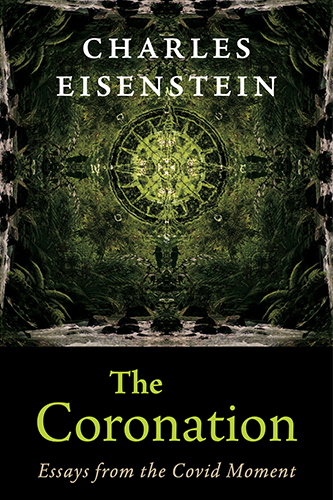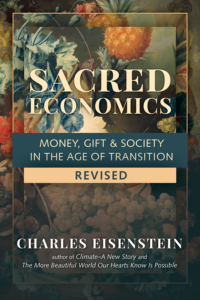The More Beautiful World Our Hearts Know Is Possible
Chapters
Chapter 9: Despair
While many people understand that the solution to climate change involves more than a disembedded choice of alternative technologies, few would say that those dedicating their lives to marriage equality for gay people, compassion to the homeless, or care for the autistic are doing something essential for the survival of our species. But that is only because our understanding of interbeing is still shallow. I would like to suggest that anything that violates or disrupts the Story of Separation will heal any and all of the consequences of that story. This includes even the tiny, invisible actions that our rational mind, steeped in the logic of Separation, says cannot possibly make a difference. It includes the kind of actions that get squeezed out by the big crusades to save the world.
I spoke recently with Kalle Lasn, the founder of the radical magazine Adbusters and a man who has devoted his entire life to promoting and practicing hands-on activism. He told me that for some time now he hasn’t been spending much time on politics or the magazine because he is taking care of his ninety-five-year-old mother-in-law. He said, “Taking care of her is far more important to me than all my other work put together.”
Kalle agreed with me when I said, “Our worldview must accommodate the truth and importance of this.” My dear reader, can you countenance a reality in which to save the planet, we have to neglect our ninety-five-year-old mother-in-law? There must be a place in our understanding of how the universe works for the intimate, uncalculated acts of service that are such a beautiful part of our humanity.
Is Kalle to trust his feeling that in taking care of this old woman he is doing something significant?
Do you not know in your bones that any belief system that denies that significance must be part of the problem?
Can you bear to live in a world in which what he is doing doesn’t matter?
We only keep performing the tasks that keep the world-devouring machine running by quelling that feeling of significance. We steel ourselves to do what some abstract reasoning tells us we must do, in the interests of practicality. Occasionally, this “practicality” means “what will help heal the ecosystem, bring about social justice, and enable the survival of our species,” but for most people, most of the time, practicality involves money or other means of security and comfort. And money, in our current system, generally comes through our participation in the conversion of nature into products, communities into markets, citizens into consumers, and relationships into services. If your heart isn’t in all that, you will find that practicality often contradicts the urging of the heart.
The problem goes much deeper than a selfish view of what is practical. It goes to the understanding of cause and effect that underlies it. The urging of the heart might not only contradict the dictates of money, it might contradict instrumentalist logic altogether.
That is not to say we should ignore the mind’s logic when attempting to make practical changes in the world, any more than we should abandon technology, literature, or any other fruits of our millennia-long journey of Separation. The tools of control, the application of force and reason, surely have their place. Humanity is not nature’s exception: as with all species, our gifts can uniquely contribute to the well-being and development of the whole. We have yet to use our gifts in this spirit; instead we have used them to dominate and conquer, weakening the health of Gaia and all her beings and, therefore, weakening ourselves as well. Now we have the chance to transform our uniquely human gifts from tools of mastery to tools of service.
Specifically, when are the methods of “practicality” appropriate? Quite simply, they are appropriate when we know how to do something from within our current understanding of causality. If your stove is on fire and you have a fire extinguisher, then of course you use the fire extinguisher. You don’t ignore it and pray for a miracle instead.
But by the same token, if your house is a roaring inferno and all you have is a puny fire extinguisher that you know is far insufficient to the task, you shouldn’t just wave it in front of the flames in a posture of heroism.
The latter situation is a good description of our current predicament. Yes, it is true, our house is on fire. What the environmental alarmists are saying is true. I am not using “alarmist” as a term of disparagement. If anything, the situation is worse than they (fearing the alarmist label) tell us publicly. But what should we do about it? Or more to the point, what should you do about it? What, according to the conventional notions of causality that nearly everyone in modern society has deeply internalized, can you do that is practical? Nothing. Therefore, we must learn to follow another kind of guidance, one that leads to an expanded realm of what is possible.
You may think it is dangerous to sow despair, even if what I say is true. But the despair is there whether I sow it or not. Every activist I have asked confirms that they have at one time or another confronted precisely the despair I am evoking. We try to obscure it with reasoning like “Sure, it makes no difference if you are the only one making changes, but if everyone does it then the world will change.” True, but is it in your power to make everyone do it? No. What you do would matter if everyone did it; by the same token, since everyone isn’t doing it, what you do doesn’t matter. I have never found an escape from this logic within its own terms. It is as sound as its premises—the separate self in an objective world. Worse yet, some would say that our individual efforts to buy local or recycle or ride bicycles are even counterproductive, giving us a false complacency, depotentiating more effective revolutionary acts, and enabling the larger mechanisms of ruin to trundle forward. As Derrick Jensen says, don’t take shorter showers.
I think it is better not to obscure the despair, because real hope lies only on its other side. Despair is part of the territory we must traverse. Until we reach the other side, despair weighs on our hearts as we soldier on, never fully believing we are doing much good. Eventually, however strong our spirits, our efforts waver, our energy flags, and we give up. Perhaps for a while, personal vanity can keep us going as we uphold a self-image of being ethical, conscious, and a “part of the solution.” But that motivation is insufficiently deep to bring us to the courage, commitment, and faith we need.
True optimism comes from having traversed the territory of despair and taken its measure. It is not ignorant of the magnitude of the crisis nor unaware of the forces that stand in the path of healing. Sometimes people confront me at talks to educate me about the power elite and their propaganda machine, their control of finance and politics, or even their mind control technologies, imagining I am unaware or willfully ignorant of the workings of our system. Or they speak of the apathy of the masses, the greed and ignorance of the people who just don’t get it and the unlikelihood of their ever changing. All of this is part of the territory of despair, with which I am intimately familiar. It isn’t that I have shied away from the bleak truth because I can’t take it. Optimism lies on the other side of it, and hope is its herald.
On its own terms, the logic of despair is unassailable. It encompasses more than just the hopelessness of the state of the planet though; it is also woven into our defining mythos, which casts us into an alien universe of force and mass. It is this mythos that at once renders us alone in the universe and at the same time powerless to significantly change it (or to change it at all, given that those same forces determine our actions too). Perhaps this is why the emotional energy behind the case for hopelessness I just described is identical to that behind rejections of alternative scientific paradigms. Readers of my earlier books will forgive me for requoting this passage from “A Free Man’s Worship” by Bertrand Russell, one of the great minds of the modern era:
That man is the product of causes which had no prevision of the end they were achieving; that his origin, his growth, his hopes and fears, his loves and his beliefs, are but the outcome of accidental collocations of atoms; that no fire, no heroism, no intensity of thought and feeling, can preserve an individual life beyond the grave; that all the labors of the ages, all the devotion, all the inspiration, all the noonday brightness of human genius, are destined to extinction in the vast death of the solar system, and that the whole temple of man’s achievement must inevitably be buried beneath the debris of a universe in ruins—all these things, if not quite beyond dispute, are yet so nearly certain that no philosophy which rejects them can hope to stand. Only within the scaffolding of these truths, only on the firm foundation of unyielding despair, can the soul’s habitation henceforth be safely built.
As I have hinted, the story on which Russell bases his conclusions is no longer so certain. A philosophy that rejects them can indeed hope to stand—on the foundation of the quantum interconnectedness and indeterminacy, the tendency of nonlinear systems toward spontaneous organization and autopoiesis; the capacity of organisms and environments to purposely restructure DNA; and the proliferation of scientific anomalies that promise further paradigm shifts to come. Without attempting to make a rigorous philosophical case for it, I will observe that all these scientific revolutions lend themselves, at least metaphorically, to a very different Story of the World.






